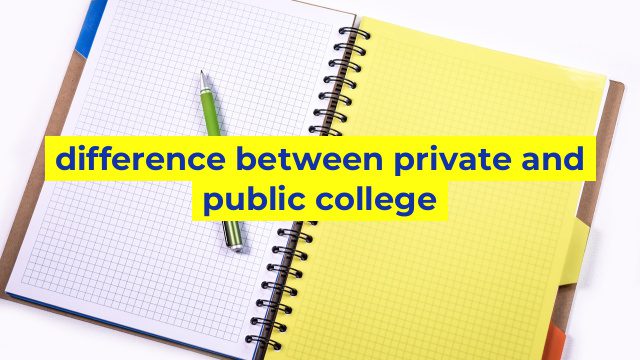The Difference Between Private and Public Colleges
When it comes to choosing a college, one of the many decisions students must make is whether to attend a private or public institution. While both options offer valuable higher education opportunities, there are some key differences between the two that should be considered before making a decision.
Cost
Perhaps the most obvious difference between private and public colleges is cost. Private colleges are often considerably more expensive than their public counterparts, with tuition fees reaching well into the tens of thousands of dollars per academic year. Public colleges, on the other hand, are often much more affordable, with some even offering tuition-free education to in-state residents.
Selectivity
Another key difference between private and public colleges is their level of selectivity. Private colleges are often highly competitive and have selective admissions processes, meaning that only a small percentage of applicants are admitted each year. Public colleges, on the other hand, tend to have more relaxed admissions requirements and accept a higher percentage of applicants.
Campus Experience
Private and public colleges also differ in terms of campus experience. Private institutions often have smaller student bodies, allowing for closer relationships between students and faculty. They also typically have more resources available to students, such as state-of-the-art research facilities and smaller class sizes. Public colleges, on the other hand, often have larger student bodies and may have more diverse student populations.
Career Prospects
Finally, private and public colleges differ in terms of career prospects for graduates. While both options can provide quality education and valuable skills, private colleges often have stronger connections with employers and may offer more opportunities for internships and job placements after graduation. Public colleges, on the other hand, may have strong ties with government agencies or local businesses, which can be beneficial for graduates seeking work in certain fields.
In conclusion, when choosing between a private or public college, it is important to consider factors such as cost, selectivity, campus experience, and career prospects. Ultimately, the decision should be based on the individual needs and goals of the student.
Table difference between private and public college
| Private College | Public College | |
|---|---|---|
| Tuition and Fees | Generally higher and can vary depending on the type and prestige of the institution. | Generally lower and set by the state government. |
| Class Size | Smaller class sizes, allowing for more individualized attention and interaction with professors. | Larger class sizes, often with limited individualized attention from professors. |
| Financial Aid | May offer more need-based financial aid, but less in merit-based scholarships. | May offer more merit-based scholarships, but less in need-based financial aid. |
| Campus Size | May have smaller or more isolated campuses, often with a strong focus on student life and community. | May have larger or more urban campuses, often with a more diverse student population and opportunities for internships and networking. |
| Academic Programs | May offer more specialized or niche programs in areas such as fine arts or religious studies. | May offer a wider range of academic programs and research opportunities. |


